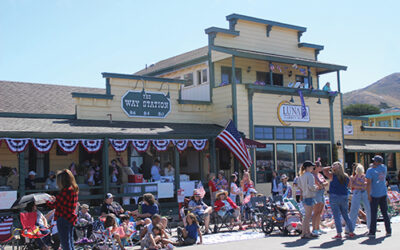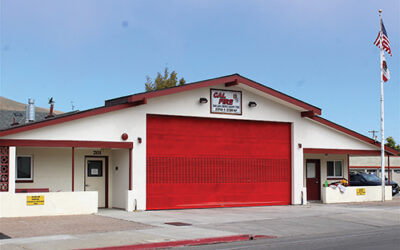The City of Morro Bay will seek a grant to study potentially extending the town’s water and sewer systems out to a mobile home and RV park that sits just outside the City Limits.
The City Council recently gave the OK to apply for State monies to look into hooking up the Rancho Colina MHP and RV park to the City’s infrastructure, helping the park owners with an issue they’re having with the Regional Water Quality Control Board.
Public Works Director Greg Kwolek presented the issue to Council asking permission to apply for State Revolving Fund Financial Assistance out of the State’s Clean Water and Drinking Water State Revolving Fund Grant program. The City is planning to have Rancho Colina initially pay for the study and be reimbursed by the grants. They’ve already negotiated a cost sharing agreement.
“Under the terms of the Cost Share Agreement with Rancho Colina Mutual Water Company,” Kwolek said, “the City will be reimbursed for up to a maximum of $25,000 in costs to prepare the Clean Water State Revolving Fund [CWSRF] and Drinking Water State Revolving Fund [DWSRF] Planning Grant applications. It is anticipated the costs to prepare and submit these grant applications will not exceed $25,000 and there will be no fiscal impact to the sewer or water fund or other City funds.”
The study will evaluate the water and wastewater utility feasibility, design of the Rancho Colina water and wastewater connections and “necessary upgrades to City water/wastewater infrastructure (via OneWater projects) and applications for the CWSRF/DWSRF Construction Grants.
“If consolidation is determined feasible and beneficial to the City by City Council, then the City would apply for CWSRF/DWSRF Construction Grants to fund the necessary expansions and upgrades to the City’s water and wastewater systems to connect Rancho Colina and accommodate the additional water demand and wastewater flows.”
Ironically, Rancho Colina, which sits about a half-mile outside the City Limits on Hwy 41, was once considered as a site for the City’s new wastewater treatment plant and water recycling facility. Ultimately, the two sides could not reach agreement and the City moved its new plant across town to a property above South Bay Boulevard.
According to the report, the Rancho Colina Mutual Water Co., “provides water, wastewater and other services for approximately 69 Mobile Homes and 57 Recreational Vehicle camping sites. The Rancho Colina Wastewater Treatment Facility is in need of significant upgrades and repairs to meet the requirements of the new General Permit for wastewater treatment facilities discharging [less than] 100,000 gallons per day. Additionally, the Rancho Colina groundwater wells have elevated concentrations of nitrates and have nearly run dry during recent droughts, forcing Rancho Colina to occasionally truck in water from other wells in the Morro Basin.”
The water board reportedly approached the City about taking on Rancho Colina to help with these problems. “Due to the fact the Rancho Colina Mobile Home Community is classified as a Disadvantaged Community, there is significant grant funding available in the CWSRF and DWSRF programs to pay for infrastructure upgrades to the City’s water and wastewater systems to accommodate the consolidation and connections to Rancho Colina’s systems.
“Based on information provided by the RWQCB and Division of Drinking Water (DDW) funding representatives, RVs are potentially not eligible for consolidation funding.”
It was the water board back in 2003 that asked the City and its partner Cayucos Sanitary District to upgrade their jointly-owned sewer treatment plant to full secondary treatment that started the ball rolling and led to the eventual divorce between the two agencies, and ultimately to new treatment plants being built in Morro Bay and Cayucos.
According to a chart in the report, Rancho Colina has a total of 126 units (69 mobile homes and 57 RV spaces). The CWSRF funding limit just for mobile homes, has a maximum of $100,000 per unit or $6.9 million total.
Under the DWSRF program for water, it has a $70,000 maximum limit per mobile home, totaling $4.8 million that could be available. In total, there could be $11.7 million available for servicing the mobile homes. But there could be more.
“Additional outside funding, up to $10M total from CWSRF and up to $6M total for DWSRF, could potentially be available for the RV units depending on how they are categorized by the CWSRF/DWSRF funding agencies or if they were converted to Mobile Homes by the operators of the Rancho Colina RV Park.”
The City Council back in September 2022 authorized hiring a consultant to work on these grant applications, according to the report. The City hired Confluence Solutions, Inc. to get that work going.
But Morro Bay has another potential speed bump in this road — a voter passed law that requires a vote of the people to approve annexations and a law that does not allow extending water or sewer service outside the City Limits, though the location of the new treatment plant is outside the City Limits now.
Kwolek told Estero Bay News, “No study has been performed. We need the grant first. The grant will pay for us to study the feasibility of the consolidation project. If we studied everything beforehand, it would be on the City’s dime.”
That feasibility should include the answers to these questions as well as a couple of more existing issues that could come into play. Namely, the City has to complete two key projects from its OneWater Plan, a work program that lays out projects needed to upgrade the City’s water system and in turn its sewer system too. Those projects are: the Main/Atascadero Street Sewer Replacement (estimated cost of $7.9M) and the Nutmeg Tank Replacement (at $17.9M).
So while these things could be tied together by necessity, it isn’t likely the City will get someone else to pay for everything that needs to be done.
“At this time,” Kwolek said, “we don’t know enough about the project feasibility to answer that. But it is unlikely the State would pay for the City’s already planned improvements in full.”
However, “The feasibility study will not address the Nutmeg Pressure Zone project or the sewer improvement projects on Atascadero/Main in a way that develops those projects.”


